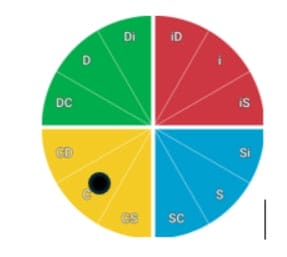The Everything DiSC model identifies C types as exceptional due to their analytical abilities combined with meticulous attention to detail and firm dedication to quality. These detail-focused professionals serve as essential support for precision-dependent tasks and demonstrate excellence in settings when logical analysis and exactness matter most.

Their inherent traits function as significant strengths but can transform into obstacles which block advancement or damage interpersonal connections. The article examines the common challenges a C type personality encounters and explains how they can use these difficulties as a basis for personal development.
Everything DiSC C Style: Overanalyzing & Getting Stuck in the Details
C types demonstrate exceptional skills in breaking down complex problems into detailed parts which makes them perfect for troubleshooting and precise planning roles. The analytical strength of C types result in overanalyzing which leads to a fixation on minor details that stops them from progressing. A C type may dedicate hours to perfecting one paragraph within a project report because they cannot ignore imperfections that elude others while refusing to ask for help. Their commitment to excellence deserves recognition but often leads to delayed deadlines and interrupted progress.
Strategy: C type personalities gain advantages by establishing well-defined limits for their analysis process. Establishing a timer or checklist reveals appropriate moments for stopping at “good enough” which helps them maintain progress without sacrificing quality. They can uphold their standards while maintaining efficiency by taking a step back to appraise the overall situation.
Everything DiSC C Style: Struggling to Accept Imperfection
High standards define C types. The excruciating standards they hold to along with their peers will drive them to deliver consistent results. However, their standard for perfection can turn into an unreasonable belief that every detail needs to be perfect. The presence of unavoidable mistakes or outside constraints often leads them to experience discouragement and frustration. A C type manager may dismiss otherwise pretty good team efforts because they did not match their precise vision leading to missed success opportunities.
Strategy: Treating imperfection as an opportunity for learning helps overcome challenges. This question enables them to accept adequate results while enhancing future work by maintaining quality standards without striving for perfection.
Everything DiSC C Style: Being Too Critical or Detached
The problem-solving abilities of C types are directly linked to their natural inclination to identify flaws. This approach makes them appear excessively critical when working with others. They tend to emphasize faults without recognizing positive aspects or accomplishments which results in others feeling discouraged or slighted. Their blunt approach to tasks frequently makes them appear detached and unapproachable to others unintentionally. They do not intend to be harsh because their worldview places greater importance on precision than praise; on the accomplishment of a task as opposed to making a new friend.
Strategy: When they combine critical feedback with positive recognition their approach becomes softer. Beginning feedback sessions with first with several positive remarks before moving to constructive criticism helps to build trust between parties. A simple act of warmth such as a nod of appreciation connects people emotionally while maintaining genuine interactions.
Everything DiSC C Style: Avoiding Emotional or Social Interactions
C types find emotional connections and informal conversations to be unfamiliar terrain. Data-driven, structured exchanges are where they excel though social or emotional unpredictability makes them withdraw; especially on the non-professional level. They can seem aloof and excessively professional in situations where human connection is essential. The C type avoids a team lunch or social events to work on spreadsheets because structured data analysis provides them with greater comfort than social activities.
Strategy: Gradually exposing themselves to new social situations enables C types to develop comfort with social interactions. Starting small talk about colleagues’ personal lives helps build connections gradually without forcing a significant change in behavior.
Resisting Fast-Paced or Unstructured Environments
C types excel when they work within environments that provide clear structures and predictable processes. Chaotic environments that move quickly and lack clear instructions can overwhelm them or make them resistant. What appears first as stubbornness reveals itself to be their need for structured systems to achieve their best performance. In an unstructured brainstorming session without a set agenda, C types become disengaged because they are frustrated by the absence of direction while other participants enjoy the creative freedom.
Strategy: Creating personal structure can ground them. Quick note-taking of priorities or the use of clarifying questions serves as a stabilizing anchor during chaotic circumstances. Flexibility may require effort to develop but they can improve this skill through practice.
The Everything DiSC C Style Takeaway: Precision Meets Adaptability
C types don’t strive for coldness or criticism but, it stems from their strong dedication to precision and logic. Their most significant strengths exist as the opposite side of their primary challenges. C types enhance their effectiveness by setting analysis boundaries and accepting functional imperfections. Engaging in social interactions helps them adapt to disorder so they can maintain their exceptional qualities.
Rather than weaknesses, C types encounter challenges that serve to expand their abilities. The most successful people combine deep expertise in their field with flexibility. C types can improve their accuracy through mindful awareness and minor adjustments to reach exceptional proficiency in both their career and life.


